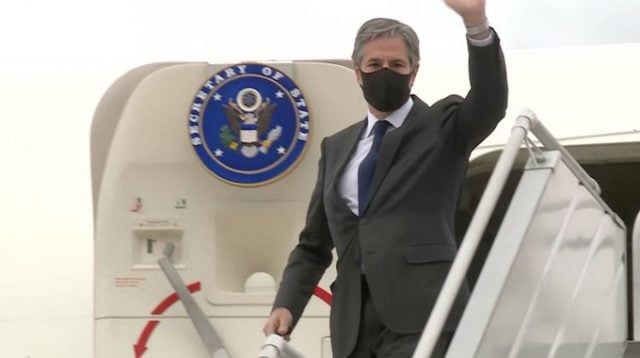The first visit of the US Secretary of State, Antony Blinken, to South America, specifically to Colombia, represents a diametrical change of agenda to those made by his predecessors in office.
During the past week, first in Ecuador and then in Colombia, this brief tour served to advance in mitigating the main headache for the US in relation to the region, since the beginning of the Joe Biden administration: migration.
When we remember the tours of the previous secretaries of State, Rex Tillerson, in February 2018, and Mike Pompeo, in September 2020, the problem in those days for the White House, with Donald Trump at the helm, was Venezuela, but it is no longer for its new tenant.
The supposed ‘Venezuelan threat’ privileged the issue of ‘regional security’, with agendas in the countries bordering that South American nation, such as Guyana, Brazil and Colombia, during the years when there was an active Lima Group, indicated an article by Ociel Alí López for RT.
Change of agenda in Colombia
After nine months of the new US administration, the Colombian ruling party was relieved to learn of Blinken’s visit, since enough time had already passed to at least receive a high official sent by Biden, with whom Iván Duque has not been able to meet, breaking the tradition that exists between both countries.
As its known, the active participation of the Colombian government in the campaign in favor of Trump in Florida left Duque out of the game in the eyes of the new tenant of the White House.
For this reason, the Colombian president took pains to try to turn the page by organizing a ministerial summit, which was attended by 17 foreign ministries, on the main concern that Blinken was bringing: the immigration issue. Though his «goodwill» did not save him.
Blinken confirmed that the only beachhead in the region is still Colombia, but he also made it clear that Duque’s remaining period in power will be to pay off debts and not for new projects.
“Accountability is of vital importance: accountability for the most serious human rights violations and abuses committed during the country’s conflict; accountability for abuses in response to this year’s protests; and, of course, accountability by those responsible for the attacks on human rights defenders, journalists and other civil society leaders”, stated the senior US official on his first visit.
Just as Duque had his candidate in the US campaign, Blinken made a gesture with one of the Colombian president’s enemies, applauding the peace agreements reached during the government of former President Juan Manuel Santos.
In addition, the US secretary demanded an evaluation of the State’s actions regarding the human rights of protesters, the policies in abandoned territories and the fight against drug trafficking, an agenda that Duque must fulfill in the remainder of his administration.
Because, before Blinken left Washington, the US Congress had processed amendments that allowed it to demand detailed information, details and reports on the resources that have been delivered to Colombia, with the possibility of re-evaluating their use, if Bogotá does not comply with humanitarian law.
During his stay in the Colombian capital, the Secretary of State was emphatic in the US’s support for the 2016 peace agreement and its effective implementation, thus raising concerns about the delay in reparation measures. and restoration of the rights of the victims of the conflict, especially due to the «little presence of the State in neglected rural areas».
Duque himself had to admit that the common agenda would be centered on «issues such as the defense of democracy in the region, the migration crisis, the fight against drug trafficking, mitigating the climate crisis» and his so-called «peace with security» policy. that seems to have left Venezuela out of the first items of the meeting.
Repercussions of the visit
Two days after Blinken’s visit to Colombia ended, Colombian authorities announced the capture of the head of the Gulf Clan, Dairo Antonio Úsuga, alias ‘Otoniel’, a drug trafficker wanted for several years and for whose arrest Washington offered a reward of 5 millions of dollars. This ‘coincidence’ has been pointed out by many detractors of Duque as a mock arrest.
Is it just a coincidence that the capture occurred hours after Blinken had left the country? We will know that, depending on how quickly his extradition is carried out, but, in any case, it is not the only «effect» attributed to the visit of the US Secretary of State.
The bicameral commission created by the Colombian legislative power to reestablish relations with Venezuela, hours before his arrival, is surely not another coincidence.
The vision of Juan Manuel Santos on the issue of Venezuela is far from that assumed by the radical right in his country, since he proposes to normalize the relationship between neighbors. This position may be prevailing in the approach of the Secretary of State, which also includes restoring the force of the peace accords.
Blinken left Duque alone talking about Venezuela, not because Washington has changed the discourse on the issue (which maintains few differences with the position that Pompeo had), but because he did not go to Colombia for that.
The priority of the US official was to present the new US political agenda, which privileges other issues which go beyond the Venezuelan issue, without lending itself to the typical scenarios that Duque used during the Trump administration, in the form of concerts, riots or humanitarian tragedies.
What he did appreciate was Duque’s policy towards Venezuelan migrants, considering that Colombia «has shown enormous generosity» in receiving them.
In any case, Blinken’s stay preceded another key visit: that of Karim Khan, the Prosecutor of the International Criminal Court, who will complete a 10-day journey between Colombia and Venezuela to intensify «direct relations with the region».


